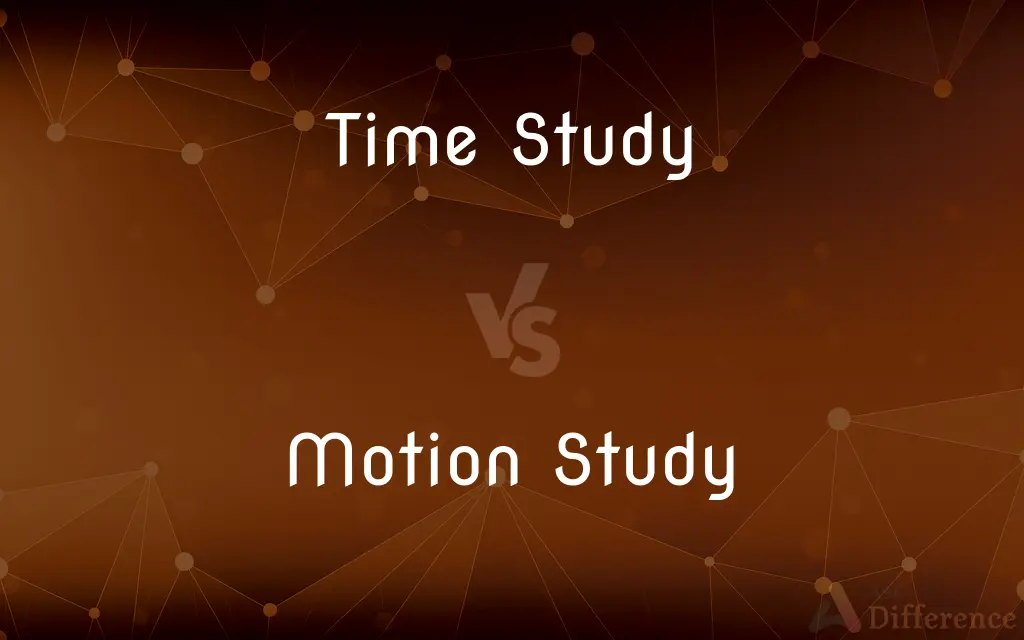Time Study vs. Motion Study — What's the Difference?
By Tayyaba Rehman — Published on October 9, 2023
Time Study measures the time a task takes for better efficiency and workflow, whereas Motion Study analyzes the actions involved in performing a task to optimize movement.

Difference Between Time Study and Motion Study
Table of Contents
ADVERTISEMENT
Key Differences
Time Study is primarily focused on the amount of time required to perform different tasks. It involves the close examination of the time taken to complete each component of a job to enhance productivity and efficiency. On the contrary, Motion Study is concentrated on analyzing the motions required to complete a task. It examines the physical movements involved in a task, aiming to optimize and standardize those movements to reduce fatigue and enhance performance.
Time Study is an essential tool for organizations aiming to enhance their operational efficiency. It enables organizations to determine standard times for task completion and identify areas for improvement. In contrast, Motion Study is crucial for understanding the physical dynamics involved in task execution. It facilitates the development of more efficient methods of task performance by refining motion processes, ultimately contributing to increased productivity and reduced operational costs.
In operational management, the implementation of Time Study techniques can significantly contribute to the optimization of workflow processes, improving time utilization and maximizing output. Motion Study, meanwhile, enables organizations to refine the physical aspects of task performance, optimizing movements, and minimizing unnecessary actions, leading to streamlined operations and improved work quality.
Utilizing Time Study, organizations can allocate resources more efficiently, establish realistic targets, and reduce idle time, optimizing overall productivity. Conversely, employing Motion Study, companies can minimize worker fatigue, enhance safety, and standardize work procedures, ensuring optimal physical execution of tasks and consistency in performance.
Comparison Chart
Focus
Measures time required to perform tasks
Analyzes motions required to perform tasks
ADVERTISEMENT
Objective
Enhance efficiency and workflow
Optimize movement and reduce fatigue
Application
Workflow optimization, resource allocation
Task performance enhancement, work standardization
Benefits
Improved time utilization, maximized output
Streamlined operations, improved work quality
Approach
Quantitative, time-centered analysis
Qualitative, movement-centered analysis
Compare with Definitions
Time Study
Time Study is used to enhance workflow and operational efficiency.
The Time Study results were instrumental in optimizing our workflow.
Motion Study
Motion Study is utilized to standardize work procedures and improve work quality.
Implementing the recommendations from the Motion Study standardized our operating procedures.
Time Study
Time Study aims to establish standard times for task completion.
Through Time Study, we established a standard time for processing each unit.
Motion Study
Motion Study involves qualitative, movement-centered analysis to streamline operations.
The Motion Study identified several movements that could be eliminated to streamline the process.
Time Study
Time Study involves quantitative, time-centered analysis to optimize productivity.
Time Study data was critical for implementing productivity-enhancing changes.
Motion Study
Motion Study aims to reduce fatigue and enhance performance through optimized movements.
The findings from the Motion Study led to improved workstations and reduced worker fatigue.
Time Study
Time Study is the systematic measurement of the time required for performing a specific task.
Implementing a Time Study helped identify bottlenecks in the production line.
Motion Study
Motion Study examines the physical dynamics of task execution to refine motion processes.
Motion Study insights enabled the refinement of task execution in the packaging department.
Time Study
Time Study analyzes each component of a job to identify areas for improvement.
Time Study revealed several steps in the assembly line that could be streamlined.
Motion Study
Motion Study analyzes the actions involved in performing a specific task to optimize movement.
A Motion Study was conducted to minimize the unnecessary movements of workers.
Common Curiosities
What is the main focus of Time Study?
Time Study mainly focuses on measuring and analyzing the time required to perform specific tasks to improve efficiency and workflow.
Is Time Study quantitative in nature?
Yes, Time Study involves a quantitative, time-centered analysis of tasks.
What does Motion Study analyze?
Motion Study analyzes the actions and movements involved in performing a task to optimize and standardize them.
Can Motion Study help in reducing worker fatigue?
Yes, Motion Study aims to optimize movements and minimize unnecessary actions, reducing worker fatigue.
How does Time Study enhance productivity?
Time Study helps in identifying bottlenecks, establishing standard times, and optimizing workflow, thereby enhancing productivity.
How can Time Study optimize resource allocation?
By establishing standard times and identifying bottlenecks, Time Study enables more efficient allocation of resources.
Does Motion Study focus on qualitative analysis?
Yes, Motion Study involves a qualitative, movement-centered analysis to optimize task performance.
How does Motion Study contribute to safety?
Motion Study enhances safety by optimizing movements and reducing the risk of strain or injury.
Can Motion Study be applied to any task?
Yes, Motion Study can be applied to any task where optimizing movements and actions is beneficial.
Does Motion Study lead to consistency in performance?
Yes, by standardizing work procedures, Motion Study ensures consistency in task performance.
Can the insights from Time Study and Motion Study be combined for operational optimization?
Absolutely, combining Time Study and Motion Study can provide comprehensive insights for optimizing both time and movements in operations.
Is Time Study crucial for setting realistic targets?
Yes, Time Study helps in setting realistic targets by providing insights into the time required for task completion.
Can Time Study be used to reduce idle time?
Yes, Time Study can identify and minimize idle time by optimizing workflow processes.
Can Motion Study improve work quality?
Yes, Motion Study can lead to improved work quality by standardizing work procedures and optimizing movements.
Is Time Study useful in workflow optimization?
Absolutely, Time Study is instrumental in analyzing and optimizing workflow for maximum efficiency.
Share Your Discovery

Previous Comparison
Mongoose vs. Ferret
Next Comparison
Fainting vs. SeizureAuthor Spotlight
Written by
Tayyaba RehmanTayyaba Rehman is a distinguished writer, currently serving as a primary contributor to askdifference.com. As a researcher in semantics and etymology, Tayyaba's passion for the complexity of languages and their distinctions has found a perfect home on the platform. Tayyaba delves into the intricacies of language, distinguishing between commonly confused words and phrases, thereby providing clarity for readers worldwide.













































